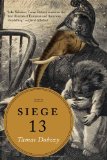Summary | Excerpt | Reading Guide | Reviews | Beyond the book | Read-Alikes | Genres & Themes | Author Bio

Stories
by Adam JohnsonAdam Johnson captured our attention with his Pulitzer Prize-winner, The Orphan Master's Son. Now he's back with Fortune Smiles, an incredibly bold and skillfully wrought collection of six short stories. He dives headfirst into difficult subjects - child molestation, terminal illness, abandonment, displacement - and explores the "how" and "why" underlying these atrocious acts and depraved desires. Johnson's writing brims with sensitivity and humanity, and he writes on such a personal level that his characters are irresistible, even if they aren't entirely likable. I found myself thinking about them, and their stories, long after I finished the book, which certainly warrants a second reading.
In the opening story, "Nirvana," set in a futuristic Palo Alto, an underground computer programmer has created an interactive, virtual reproduction of the (assassinated) President of the United States using old video footage and audio clips. Drawn to his invention, he speaks to the President late at night, asking for advice, looking for paternal reassurances, trying to figure out how to cope with the very real problems in his life. His wife, paralyzed from the shoulders down, has Guillain-Barré syndrome and struggles to believe she might recover. Lying in bed, she listens to Nirvana (see Beyond the Book) on her headphones and contemplates life and death.
In this story, Johnson looks at loneliness in an age when people are rarely alone - drones zoom by and click photos, and other electronics provide easy distractions from reality - while individuals yearn for connection. He writes: This feeling of being in proximity to something that's lost to you, it seems like my whole life right now. Johnson's creative imagining of the future feels eerily familiar, like it's a time we're not too far away from, and he deftly captures a kind of sad tenderness that makes readers ache with understanding.
"Dark Meadow," the darkest and most intense story in the collection, and also my favorite, is told from the perspective of a pedophile - known as Mr. Roses - who, with great effort, tries to fight his own perverted tendencies. He teeters on the edge of succumbing to temptation and feels agonizing guilt and self-disgust. Matters are made even more complicated when two neighborhood girls - one of whom he calls Cub who "activates" his tendencies - come to him for protection after they've been left alone by their irresponsible mother. Johnson's descriptions are so uncanny and impeccably written - a home refrigerator filled with school-sized milk containers and a completely unadorned house save for a complete set of National Geographic magazines - they work to create an all-consuming tension in the story. Johnson very successfully blurs the line between good and evil and dares to make his protagonist a sympathetic character, which only adds to the story's depth.
"George Orwell was a Friend of Mine" is the story of a man, Hans, who was an administrator at Hohenschönhausen prison, a Stasi prison that tortured and abused its prisoners, before it was closed down and turned into a monumental museum. Left by his wife and child, Hans doesn't understand why he is now alone. He feels abandoned, self-righteous, and vehemently insists that: I have done nothing wrong...I have hurt no one...I followed all the rules. Hans's level of denial is incredible and makes one wonder how he could possibly believe his version of the truth. In this way, Johnson creates a pathetic, almost pitiable character who is very, very interesting. The pages turn themselves as the reader is transported into this dark world.
"Fortune Smiles," while exquisitely written, did not draw me in the way that the other stories did. (Though, I think this speaks to the strength of the other stories as opposed to the weakness of this one.) Here Johnson's language is at its most illustrious and poetic: He didn't want to fall into reverie about the North. He did miss Chongjin, the salty smell of fishing nets hung to dry, the jade-green waves of the East Sea.
Overall, Johnson's storytelling is exceptional, both in subject and style. His writing is audacious and he knows how to use difficult subjects as a way of exposing life's complexities, rather than for cheap shock value. I highly recommend Fortune Smiles to readers who appreciate multifaceted characters and strong, emotive writing that crackles with creativity, though not to the faint of heart.
![]() This review was originally published in The BookBrowse Review in October 2015, and has been updated for the
October 2016 edition.
Click here to go to this issue.
This review was originally published in The BookBrowse Review in October 2015, and has been updated for the
October 2016 edition.
Click here to go to this issue.

If you liked Fortune Smiles, try these:

Happiness Is a Chemical in the Brain
by Lucia Perillo
Published 2013
Set in a small town in the Pacific Northwest, Lucia Perillo's story collection is a sharp-edged, witty testament to the ambivalence of emotions, the way they pull in directions that often cancel one another out or twist their subjects into knots.

by Tamas Dobozy
Published 2013
From celebrated short-story writer Tamas Dobozy, Siege 13 is a powerful testament to war's ability to carefully and thoroughly decimate the human spirit.
Your guide toexceptional books
BookBrowse seeks out and recommends the best in contemporary fiction and nonfiction—books that not only engage and entertain but also deepen our understanding of ourselves and the world around us.